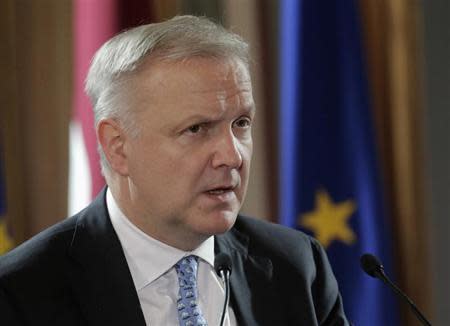Lithuania must show sustainable public finances to adopt euro - EC

VILNIUS (Reuters) - Lithuania must demonstrate its public finances are sustainable in the medium term to win approval to adopt the euro in 2015, Olli Rehn, the European commissioner in charge of economic and monetary affairs, said on Saturday.
The Baltic state, which aims to follow Latvia's entry this year, plans to make up for old age and disability pension cuts imposed during 2010-2011 which might require 1-1.2 billion litas ($400-475 million) in additional spending or about 1 percent of its gross domestic product (GDP).
There are also calls to raise the minimum wage sharply from the next year to compensate for anticipated increase in prices and living costs after euro adoption.
While Lithuania was making a good progress in meeting euro adoption criteria, it was "particularly important" for Lithuania to ensure its public finances are sustainable over a medium term, the European Commissioner said.
"I have encouraged the minister of finance, the government and parliament to ensure that Lithuania can make sure its public finances are indeed kept on a sustainable path," Rehn told a news conference after meeting with the Baltic state's Finance Minister Rimantas Sadzius.
Lithuania still needs to show that its public sector deficit, one of the euro adoption criteria, did not exceed the threshold of 3 percent of GDP in 2013.
Sadzius said he was "optimistic" that the deficit for 2013 will be below 3 percent when the country report figures to the European Commission in early March.
The budget for this year targets a public sector deficit of 1.9 percent of GDP, down from an expected 2.9 percent in 2013.
Lithuania's fiscal discipline law requires the government to cut the deficit by 1 percentage point each year until it achieves a balanced budget, now expected in 2016.
To adopt the euro, the government still needs to ask formally the European Commission and the European Central Bank to assess its readiness to switch to the single currency.
EC and ECB could present their conclusions on Lithuania's application in early June, and the EU could formally decide on euro adoption in July, Rehn said.
Lithuania meets other euro adoption criteria related to inflation, public debt, long-term interest rates, and having a stable peg to euro. Its national currency, the litas, has been pegged to euro at a fixed rate since 2002.
The former centre-right government rejected calls to devalue the litas when its economy shrank almost 15 percent in 2009, instead slashing public investment and wages to restore competitiveness.
The finance ministry expects the economy to have grown by 3.2 percent in 2013, and to expand further by 3.4 percent in 2014.
The country failed to get approval for euro entry in 2007 after inflation overshot the threshold by a whisker.
(Reporting by Andrius Sytas. Writing by Nerijus Adomaitis; Editing by Toby Chopra)


